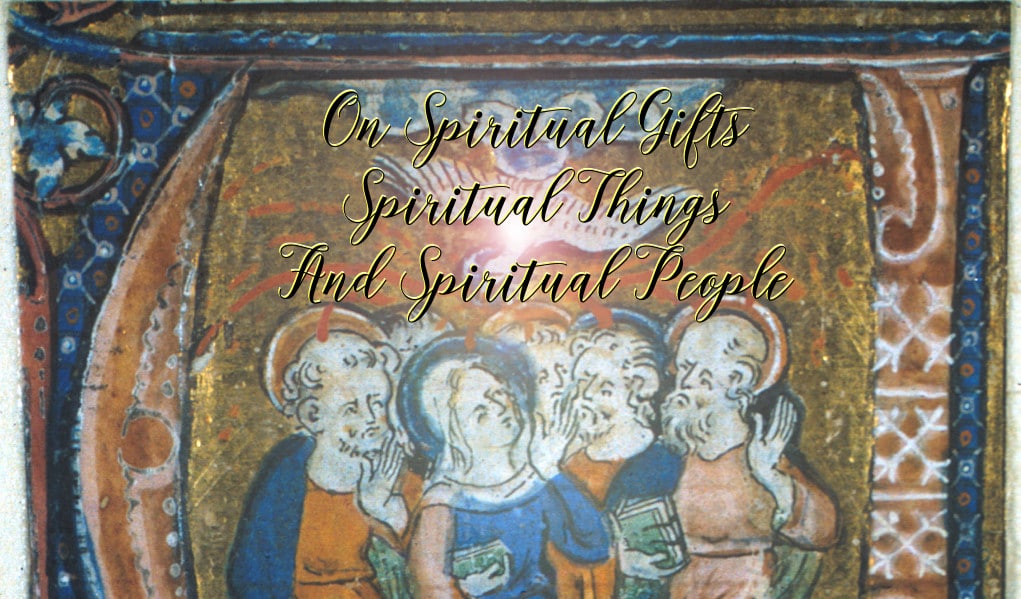Lately, I’ve been bothered by a lot of wildly inaccurate teachings on spiritual gifts. On one side, there are the charismatics, supposedly people who believe in and practice spiritual gifts in accordance with 1 Corinthians 12 through 14, and elsewhere in the Bible.
On the other side, there are the non-charismatics, people who either say spiritual gifts are still around but shouldn’t be used because after all, some have been abused by those wielding spiritual gifts, or that spiritual gifts have ceased because the perfect Bible has come and people don’t need spiritual gifts anymore, so you can ignore every other reference to spiritual gifts in the Bible, especially 1 Corinthians 12 through 14.
As this 3-part article explains, this dualism – charismatics and non-charismatics- creates a superficial, false and non-biblical dichotomy regarding spiritual gifts.
In addition, there are those who criticize Seers See Ministries for comforting, encouraging, and training spiritually gifted people who see into the spirit realm. Critics suggest that this seer “gift” is an occult-related curse or doorway into demonic darkness, and so at worst attack or at best reject those who say they can see spiritual things.
For several years, I’ve encouraged people to think of “seeing in the spirit realm” as less of a gift and more of an ability. The argument back from the skeptics invariably is something like, “That’s not biblical, therefore it’s not from God: it’s demonic.”
This 3-part article seeks to bring some correction to the discussion on spiritual gifts and is the result of some research that forms the basis for a few chapters in my forthcoming book – Seer Tribe. Frankly, this research has shaken and remade my understanding of spiritual gifts as they are discussed in the Bible. The Bible has forced me to think differently regarding these things, which is the essence of repentance and the root of living in the Kingdom of God Mindset. I’m excited to share what I’ve learned.
A Fresh Biblical Teaching Regarding Spiritual Gifts
I believe that our understanding of spiritual gifts and their uses should be rooted in the Bible and I fervently desire to adapt my thinking to the ideas the writers of the Bible were trying to convey. Of course, everyone says that first bit – about rooting spiritual beliefs in the Bible – but not everyone says or means the last part – about getting at what the biblical writers meant.
These days, tradition and denominational theologies often override biblical theology. Too many biblical commentators import their own ideas into the Bible and twist scriptures to support them. Many others actually make up new definitions of biblical words, definitions the biblical writers never conceived of. Then they import those definitions into the Bible creating The Bible: Redefined in Their Own Mind, for support of their wild practices.
Rather than going into details about all that is wrong in the charismatic/non-charismatic thinking and practice (that would be a depressing work), I will show a better way to approach the biblical concept of spiritual gifts.
1 Corinthians 12:1: “Concerning Spiritual Gifts.”
Let’s start with Paul’s “essay” on spiritual gifts in 1 Corinthians 12 through 14. Robert Jamieson, et al, in Commentary Critical and Explanatory on the Whole Bible, vol 2 summarizes the three chapters starting with 1 Corinthians 12:
…spiritual gifts, the signs of the Spirit’s continued efficacious presence in the Church, …The ordinary and permanent gifts are comprehended together with the extraordinary, without distinction specified, as both alike flow from the divine indwelling Spirit of life… Now that we have the whole written New Testament (which they had not) and Christianity established as the result of the miracles, we need no further miracle to attest the truth.”[ref] Robert Jamieson, A. R. Fausset, and David Brown, Commentary Critical and Explanatory on the Whole Bible, vol. 2 (Oak Harbor, WA: Logos Research Systems, Inc., 1997), 286.[/ref]
For Jamieson, there are two kinds of spiritual gifts: ordinary and extraordinary, although admittedly Paul doesn’t draw a distinction between the two, nor does Paul or anyone else in the Bible give a hint at what is extraordinary and what is permanent.
To me all of God’s gifts are extraordinary.
But what if 1 Corinthians 12 through 14 aren’t really about “spiritual gifts” at all? What if understanding this passage as about spiritual gifts is a tradition not rooted in scripture at all, and really, the passage is about something else?
If the passage isn’t really about spiritual gifts, then perhaps Jamieson’s thoughts should be discarded, rather than Paul’s.
Spiritual Things or Spiritual People
1 Corinthians 12:1 is translated from biblical Greek into English, “Now concerning spiritual gifts, brothers, I do not want you uniformed…”[ref]Unless otherwise noted, all passages are from the English Standard Version.[/ref]
Greek has several words translated as “gifts,” but none of them is in the Greek text of 1 Corinthians 12:1. This is evident in the King James Version, because words added by the King James translators are italicized.[ref]Unless otherwise noted, screenshots are from Logos Bible Software 7.9 SR-1, on various dates in October, 2017.[/ref]

English translators added the English word “gifts” to the text. A Greek word commonly associated with “spiritual gifts,” charismaton, from where we get “charismatic”, is not included in the opening verse. I suppose most modern translations insert “gifts” there because translators believe the entire passage is about “spiritual gifts.”
But it’s not. It’s about spiritually gifted people. Let’s dive in to explain this point.
You don’t need to know Greek to understand this. You just need some software like Logos Bible Software, from which I’m supplying screenshots. Here is an image with the Greek behind the ESV translation. Notice the dot beneath “gifts”, which means there is no Greek word behind the English word added by translators. Additionally, notice the footnote.

There is no word for “gifts” to be translated. Notice under spiritual, the τῶν in front of πνευματικῶν. The word τῶν is a gender neutral article (“the”), and πνευματικῶν is an adjective that is either neutral or masculine (“spiritual”), pneumatikos. Maybe the translation should be “concerning the spiritual…” what, exactly?
For all the discussion of “spiritual gifts” among charismatics and non-charismatics, pneumatikos charismaton – “spiritual gifts” – only occurs a single time in the entire Bible, and never in 1 Corinthians. It’s in Romans 1:11.
![]()
And in this single case, it’s Paul giving spiritual gifts, not the Holy Spirit.
“Well,” some may counter, “when Paul uses charisma (or charismaton), he always means the charismatic spiritual gifts. That’s where we get the word from after all.”
Really?

According to Romans 6:23, if you are a believer in Jesus Christ, you have received the charismatic gift of eternal life. You are a charismatic.
And if you’re, in the modern sense, really charismatic, get over yourself. You’re not that special. All believers are charismatic.
So, let’s just drop the modern parlance, the false and unbiblical dichotomy, and start adopting the biblical framework when it comes to spiritual gifts.
Oh, and we’re only getting started.


Leave a Reply